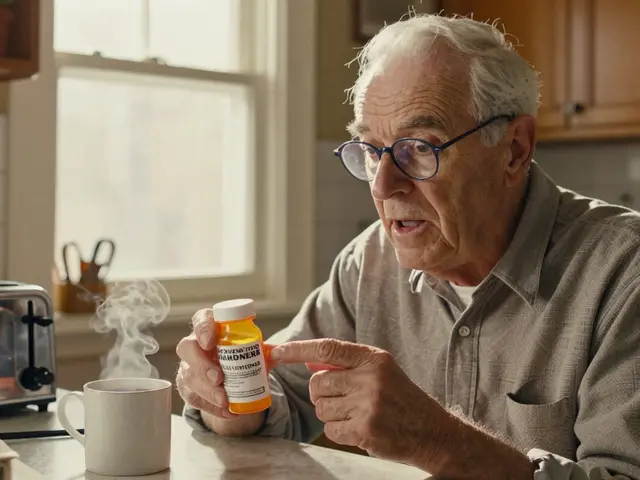Yohimbe-Blood Pressure Medication Interaction Checker
Select your blood pressure medications
Have you taken yohimbe recently?
Interaction Risk Assessment
When you’re trying to boost energy, lose weight, or improve performance, it’s easy to assume that something labeled "natural" is safe. But yohimbe is one of those supplements that breaks that myth - hard. It’s sold in gyms, online stores, and health food shops as a male enhancement or fat-burning aid. But if you’re taking any kind of blood pressure medication, yohimbe could put you in the emergency room.
What Is Yohimbe, Really?
Yohimbe comes from the bark of a tree native to West Africa. Its main active ingredient, yohimbine, was first isolated in 1896 and later approved by the FDA in 1989 as a prescription drug for erectile dysfunction. But today, you won’t find Yocon on pharmacy shelves. It’s been replaced by safer, more reliable drugs like sildenafil. What’s still available? Unregulated yohimbe supplements - often sold as capsules, powders, or teas with no consistent dosing. The problem isn’t just that it’s unregulated. It’s that the amount of yohimbine in each pill can vary wildly. One study tested 49 U.S. brands and found yohimbine content ranged from undetectable to over 6 milligrams per serving. That’s a 1,200% difference. Some products didn’t even contain real yohimbe - they were laced with synthetic yohimbine, a stronger, more dangerous version. And 68% of these supplements got the label wrong by more than 200%.How Yohimbe Affects Your Blood Pressure
Yohimbine works by blocking alpha-2 receptors in your nervous system. Normally, these receptors act like brakes on adrenaline and norepinephrine - the chemicals that make your heart race and your blood vessels tighten. When yohimbine shuts them off, your body floods with these stimulants. Your heart rate spikes. Your blood pressure surges. In healthy people, this might just cause jitteriness or a headache. But if you’re already on blood pressure medication, it’s like slamming the gas pedal while someone else is trying to brake. The result? Dangerous spikes in systolic pressure - sometimes over 200 mmHg. The Memorial Sloan Kettering Cancer Center says yohimbine can raise systolic blood pressure by 20 to 30 mmHg in susceptible people. That’s enough to trigger a hypertensive crisis.Which Blood Pressure Medications Are Dangerous to Mix With Yohimbe?
Yohimbe doesn’t just interfere with one type of blood pressure drug. It clashes with nearly all of them.- Clonidine (Catapres) and guanfacine: These drugs work by activating alpha-2 receptors to lower blood pressure. Yohimbine blocks those same receptors. The result? A sudden, violent rebound in blood pressure - up to 50 mmHg spikes reported.
- Beta-blockers like metoprolol and atenolol: These slow your heart rate. Yohimbe speeds it up. Your heart gets conflicting signals, which can cause arrhythmias.
- ACE inhibitors like lisinopril and enalapril: These relax blood vessels. Yohimbe tightens them. The two cancel each other out, and your pressure rockets.
- Calcium channel blockers like amlodipine: These reduce heart strain. Yohimbe increases it. Studies show this combo raises heart attack risk.
- Diuretics like hydrochlorothiazide: These reduce fluid volume. Yohimbe causes fluid retention and vasoconstriction. The net effect? Higher pressure, not lower.

What Happens When You Combine Yohimbe With Other Drugs?
It’s not just blood pressure meds. Yohimbe also dangerously interacts with antidepressants.- Tricyclic antidepressants like amitriptyline and SNRIs like venlafaxine: These increase norepinephrine levels. Add yohimbine, and you’re doubling down on the stimulant effect. A 2022 study documented 17 cases of systolic blood pressure above 180 mmHg - all requiring emergency treatment.
- Clenbuterol: Used by some for weight loss, this drug already raises heart rate and blood pressure. Combine it with yohimbine, and the risk of hypertensive crisis jumps by 300%.
Real People, Real Emergencies
Numbers don’t tell the whole story. Real people are getting hurt. A Reddit thread from June 2022 titled “Yohimbe nearly killed me while on lisinopril” had 147 comments. Thirty-two users shared stories of blood pressure readings over 200 mmHg after taking yohimbe. One man ended up in the ICU with a stroke. Another had a heart attack at age 39. WebMD’s review section shows 87% of 214 users with hypertension reported negative effects. Over 60 of them specifically mentioned dangerous spikes. The California Poison Control System tracked 7 years of data (2000-2007) and found yohimbe-related calls were 78% more likely to require medical intervention than calls for other supplements. And the victims aren’t elderly. The average age of people hospitalized after taking yohimbe? 37. That’s younger than most people diagnosed with chronic hypertension.
Why Is This Still Available?
You’d think after 127 FDA-reported adverse events - including 19 hospitalizations for hypertensive crisis - yohimbe would be banned. But in the U.S., it’s still sold as a dietary supplement. That means it’s not held to the same safety standards as prescription drugs. The FDA issued a mandatory recall in January 2023 after testing found some products contained as much as 28.7 mg of yohimbine per serving - nearly six times the labeled amount. But enforcement is slow. Meanwhile, U.S. sales hit $38.7 million in 2021, mostly marketed for “male enhancement.” Other countries aren’t so tolerant. Canada banned yohimbe in 2020. Australia and the European Union followed suit. The European Medicines Agency called the cardiovascular risks “unacceptable.”What Should You Do?
If you’re taking any blood pressure medication - even if your numbers are controlled - don’t take yohimbe. Period.- Check your supplement labels. If it says “yohimbe,” “yohimbine,” or “Pausinystalia yohimbe,” put it down.
- Ask your pharmacist to review all your supplements. Many don’t realize herbal products can interact.
- Tell your doctor if you’ve taken yohimbe, even once. They need to know when interpreting your blood pressure readings.
- If you’ve already taken it and feel dizzy, have chest pain, or your heart is racing, seek help immediately.
Alternatives to Yohimbe
If you’re looking for energy, weight loss, or sexual health support, there are safer options.- For weight loss: Focus on proven methods - calorie control, strength training, sleep, and stress management. No supplement beats consistency.
- For energy: Caffeine in moderation (under 400 mg/day) is well-studied and safe for most people on blood pressure meds - if you’re not sensitive to it.
- For sexual health: Talk to your doctor. Prescription treatments like sildenafil or tadalafil have decades of safety data. They’re not perfect, but they’re predictable.
Can I take yohimbe if I have high blood pressure but am not on medication?
No. Even if you’re not on medication, yohimbe can trigger dangerous spikes in blood pressure. The American Heart Association warns that people with hypertension - even uncontrolled or undiagnosed - are at high risk for hypertensive crisis when using yohimbe. It’s not safe just because you’re not taking pills.
How long does yohimbe stay in your system?
Yohimbine has a half-life of 0.5 to 1.5 hours, meaning half of it clears from your blood within that time. But its effects on your nervous system can last longer - up to 4 to 6 hours. If you took it and are on blood pressure medication, the interaction risk doesn’t disappear just because you feel fine. It can still build up or trigger delayed spikes.
Are there any safe herbal alternatives to yohimbe for energy or libido?
There are no herbal supplements proven to be both safe and effective for these purposes in people with cardiovascular risks. Ginseng, maca, and horny goat weed have been studied, but none show consistent, reliable results - and many still carry unknown interaction risks. The safest approach is to avoid unregulated herbs entirely and work with your doctor on evidence-based solutions.
What should I do if I accidentally took yohimbe with my blood pressure medicine?
Monitor your symptoms closely. If you feel your heart racing, have a severe headache, feel dizzy, or notice chest tightness, check your blood pressure if you can. If your systolic reading is above 180 mmHg or you feel unwell, go to the emergency room. Don’t wait. Yohimbe interactions can escalate quickly.
Why do supplement companies still sell yohimbe if it’s so dangerous?
Because the supplement industry operates with minimal oversight. Companies aren’t required to prove safety before selling. They’re only held accountable after harm occurs. Marketing claims like "natural energy booster" or "male performance enhancer" appeal to consumers who don’t understand the risks. Profit outweighs caution - until someone ends up in the hospital.
If you’re trying to improve your health, the best choices are the ones that don’t rely on untested powders in bottles. Your heart doesn’t need a shortcut. It needs consistency, care, and respect - not a risky supplement with a misleading label.






Comments
Rashmi Mohapatra
3/Nov/2025bro i took yohimbe last month thinkin it was just some herbal energy boost... my bp spiked to 190 and i thought i was dyin. why do these companies even sell this? its not natural if it tries to kill you
Kelsey Veg
3/Nov/2025the data here is solid but the real problem? people dont read labels. i saw a guy at the gym take yohimbe powder like it was protein. he had a heart monitor on his wrist and still did it. dumbass culture.
Alex Harrison
3/Nov/2025i work in pharma and this is exactly why the FDA needs to crack down on supplements. the labeling inconsistencies are insane. one batch has 0.5mg, the next has 12mg. how is this legal? people are dying because of poor quality control and greed.
Jay Wallace
3/Nov/2025America lets this fly while Europe bans it... of course. we're the land of 'if it's not FDA-approved, it's probably better'. you think a guy in Berlin would risk his life with this? no. he'd go to a doctor. we're not a country that values science. we value 'natural' and 'fast'.
Alyssa Fisher
3/Nov/2025it's interesting how we treat 'natural' as inherently good. we've forgotten that nature is full of toxins. poison ivy is natural. hemlock is natural. yohimbe is just another plant with a dangerous alkaloid. the real issue isn't the supplement-it's the cultural belief that 'natural' = safe. that's the myth that needs debunking.
Alyssa Salazar
3/Nov/2025the pharmacokinetics here are terrifying. yohimbine’s alpha-2 antagonism + ACE inhibitors = uncontrolled sympathetic overdrive. and let’s not even get into the CYP450 interactions with SSRIs. this isn’t just a 'maybe dangerous' thing-it’s a pharmacological time bomb. anyone taking this needs to be monitored like a cardiac patient.
Beth Banham
3/Nov/2025i used to take this for 'focus'... until i had a panic attack that felt like a heart attack. stopped cold. never looked back. i get why people use it-life’s hard, you want a boost-but there are safer ways. your body isn’t a lab experiment.
Brierly Davis
3/Nov/2025if you’re thinking about trying this, just pause. ask yourself: why do i need a chemical in a bottle to feel good? build habits. move your body. sleep. hydrate. those are the real supplements. yohimbe isn’t a shortcut-it’s a trap. you’re worth more than a risky pill.
Amber O'Sullivan
3/Nov/2025the fact that this is still sold here is criminal. europe banned it because they care about people. we let corporations profit off ignorance. if you’re on any med for bp you’re already at risk. dont add this to the pile. your life is not worth a quick fix
Jim Oliver
3/Nov/2025So you took a plant extract, didn’t read the label, didn’t consult a professional, and now you’re surprised you almost died? Congrats. You’re the reason we need mandatory warning labels in neon pink. This isn’t a tragedy. It’s a predictable consequence of laziness and arrogance.